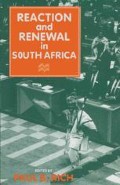Abstract
During the period 1985–9 approximately 5 400 people were killed in politically-related violence in South Africa (in 1989 alone, the highest figure during this period, 1 400 people died). From 1990 until the end of March 1994 a further 14 211 died (2101 in 1990; 2 582 in 1991; 3 499 in 1992; 4 398 in 1993; and 1 631 during the first three months of 1994). The majority of these people died in Natal and KwaZulu.1
Access this chapter
Tax calculation will be finalised at checkout
Purchases are for personal use only
Preview
Unable to display preview. Download preview PDF.
Notes
Paul Forsyth and Gerhard Mare, ‘Natal in the New South Africa’ in Glenn Mos and Ingrid Obery (eds), South African Review 6: from ‘Red Friday’ to CODESA (Johannesburg: Ravan Press, 1992).
SAIRR, Race Relations Survey, 1978, pp. 353–4.
Gerhard Mare and Georgina Hamilton, An Appetite for Power: Buthelezi’s Inkatha and South Africa (Bloomington and Indianapolis: Indiana University Press, and Johannesburg: Ravan Press, 1987), pp; 136–49.
E.J. Langner, ‘The Founding and development of Inkatha Yenkululeko Yesiziwe’, M.A. Diss., University of South Africa, 1983, p. 198.
G. Mare, ‘Inkathagate Revisited’, Southern African Report, 7, 2 (1991).
See Hugh Murray (ed.), Indaba (a publication of the journal Leadership: 1987)
Karin Roberts and Granarne Howe (eds), New Frontiers: the KwaZulu/ Natal debates (Johannesburg: SAIRR, 1987)
South African Institute of Race Relations, Race Relations Survey 1984 (Johannesburg: SAIRR, 1984), p. xvii.
Quoted in Mzala, Gatsha Buthelezi: Chief With a Double Agenda (London: Zed Press, 1988), p. 124.
Daniel Nina, ‘Popular Justice and Civil Society in Transition: a Report from the “Front Line” — Natal’, Transformation, 21 (1993), 59–60.
Praisley Mdluli (Blake Nzimande), Ubuntu-Botho: ‘Inkatha’s “people’s education’“, Transformation, 5, 1987
Gerhard Mare, ‘Education in a liberated zone: Inkatha and education in Kwazulu’, Critical Arts, 4, 4–5 (1988)
also see Catherine Campbell, Gerhard Mare and Cherryl Walker, ‘Evidence for an Ethnic Identity in the Life Histories of Zulu Speaking Durban Township Residents’, paper presented to African Studies Seminar, University of Natal, Durban, 1993, p. 20.
SAIRR, Race Relations Survey, 1991, il.
J.C. Bekker and G. Carpenter, Butterworths Selection of Statutes Constitutional Law (Durban: Butterworths, 1994).
African National Congress, Agreement between the African National Congress and the Royal House ofKwazulu (‘Skukuza document’), 8 April 1994, p. 1.
Blade Nzimande in Natal Witness, 21 December 1993.
King Goodwill, ‘Presentation by His Majesty King Zwelithini Goodwill ka Bhekuzulu … to Mr Nelson Mandela’, 8 April 1994, p. 5.
Anton Harber and Barbara Ludman (eds), A-Z of South African Politics: the essential handbook (Harmondsworth: Penguin Books, 1994), p. 182.
For an early indication of this strategy, see William Kentridge, An Unofficial War: Inside the Conflict in Pietermaritzburg (Cape Town: David Philip, 1990).
Editor information
Editors and Affiliations
Copyright information
© 1996 Macmillan Press Ltd
About this chapter
Cite this chapter
Mare, G. (1996). Civil War Regions and Ethnic Mobilisation: Inkatha and Zulu Nationalism in the Transition to South African Democracy. In: Rich, P.B. (eds) Reaction and Renewal in South Africa. Palgrave Macmillan, London. https://doi.org/10.1007/978-1-349-24772-1_2
Download citation
DOI: https://doi.org/10.1007/978-1-349-24772-1_2
Publisher Name: Palgrave Macmillan, London
Print ISBN: 978-1-349-24774-5
Online ISBN: 978-1-349-24772-1
eBook Packages: Palgrave Political & Intern. Studies CollectionPolitical Science and International Studies (R0)

